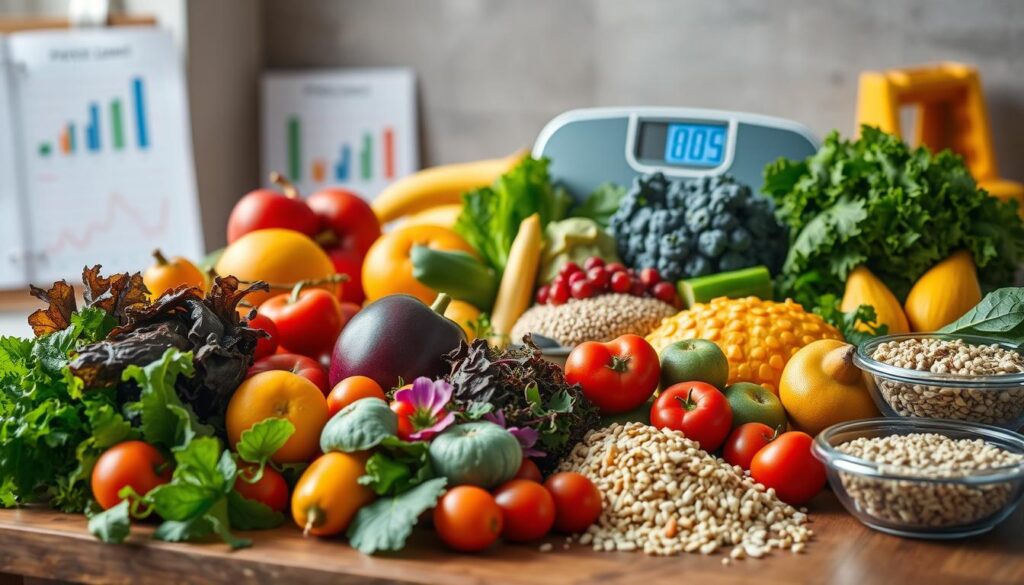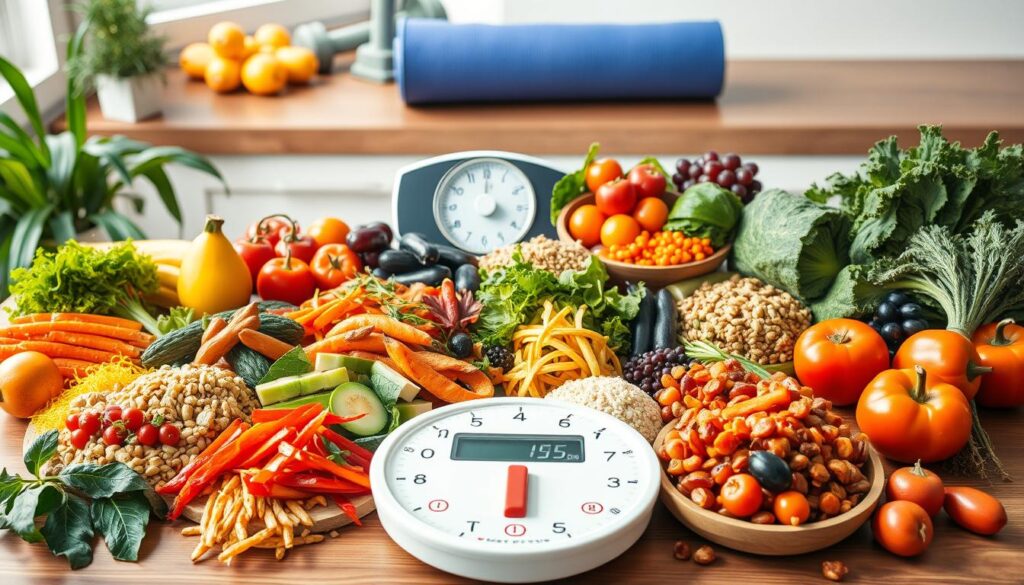Want to lose weight and feel better? A vegan diet might be just what you need. It’s all about eating plants and no animal products. This way, you can lose weight and keep your heart healthy.
But, losing weight on a vegan diet takes some planning. We’ll show you how to start and keep going on your vegan weight loss journey. You’ll learn the basics and get tips to help you succeed.
Key Takeaways
- The vegan diet excludes all animal-derived products, including meat, dairy, eggs, and honey.
- Vegan diets can be effective for weight loss and improving overall health.
- Creating a calorie deficit is crucial for weight loss on a vegan diet.
- Focusing on nutrient-dense, low-calorie-dense plant-based foods is key.
- Incorporating regular physical activity can further support your weight loss goals.
Understanding the Basics of Plant-Based Weight Loss
Starting a vegan nutrition plan can help you lose weight. Unlike other diets, it doesn’t include animal products. Instead, it focuses on eating whole, plant-based foods.
What Makes Vegan Diet Different
The vegan diet is different because it doesn’t have animal products. This means no meat, dairy, eggs, or honey. Eating this way can make your diet richer in nutrients and fiber, helping you lose weight.
Key Principles of Vegan Weight Loss
To lose weight on a vegan diet, follow these key steps:
- Eat whole, minimally processed plant-based foods
- Watch your portion sizes to control calories
- Get enough protein from plant-based sources
Creating a Caloric Deficit on a Vegan Diet
To lose weight, you need to eat fewer calories than you burn. Aim for a 500-1,000 calorie deficit each day. This can help you lose 1-2 pounds a week. Knowing about calorie density helps you choose filling, low-calorie foods.
“Following a healthy plant-based diet may reduce the risk of heart disease, with diets rich in vegetables, fruits, whole grains, legumes, and nuts showing the most significant benefits.”
By following a vegan diet and eating fewer calories, you can start a journey to better health and weight loss.
Getting Started with Vegan Diet Lose Weight Plan
Starting a vegan diet for weight loss is exciting. Begin by swapping animal foods for plant-based ones. Choose whole foods like fruits, veggies, legumes, and grains. This helps you lose weight and get all the nutrients you need.
Plan your meals ahead. Find tasty vegan recipes with lots of nutrients. This keeps you on track and ensures a balanced vegan meal plan.
Drinking enough water is key. Try to drink 8 cups a day. It helps your body work right and keeps fluids balanced.
Tracking what you eat is helpful at first. It shows you what works best for losing weight. This helps make your vegan meal plans better.
| Vegan Meal Plan Calorie Details | Calories | Protein | Carbs | Fiber | Fat | Sodium |
|---|---|---|---|---|---|---|
| 1,200-calorie Vegan Plan | 1,221 | 50g | 137g | 38g | 59g | 1,586mg |
| Alternative 1,200-calorie Vegan Plan | 1,208 | 44g | 149g | 33g | 50g | 1,253mg |
| Variation 1,200-calorie Vegan Plan | 1,211 | 51g | 118g | 32g | 65g | 2,065mg |
For a successful vegan weight loss, eat whole foods, drink plenty of water, and watch your portions. A bit of planning and trying new things will help you reach your health goals.
Essential Nutrients for Successful Vegan Weight Loss
When you eat vegan for weight loss, make sure you get all the nutrients your body needs. You need protein, vitamins, and minerals. A good plant-based diet helps you lose weight and stay healthy.
Plant-Based Protein Sources
Protein helps keep your muscles strong and keeps you full. Vegans can get protein from many plant foods, like:
- Legumes (lentils, chickpeas, beans)
- Tofu and tempeh
- Seitan (wheat-based meat alternative)
- Quinoa
- Nuts and seeds
Important Vitamins and Minerals
On a vegan diet, watch out for vitamin B12, iron, calcium, vitamin D, and zinc. You can find these in:
- Fortified cereals and plant-based milk
- Dark, leafy greens
- Legumes, nuts, and seeds
- Nutritional yeast
Healthy Fats in Vegan Diet
Healthy fats make you feel full and keep you healthy. Good vegan fats come from:
- Avocados
- Nuts and seeds
- Olives and olive oil
- Coconut oil
Getting the right mix of protein, carbs, and fats is important. It helps you stay full and lose weight on a vegan diet.
“Maintaining a balanced vegan diet can be incredibly beneficial for weight loss, as it provides a wide range of nutrient-dense, low-calorie options.”
Meal Planning and Preparation Tips
Starting a vegan lifestyle is easy. Just plan and prepare your meals ahead. This way, you can enjoy tasty and healthy vegan dishes that help you lose weight. Plan to eat non-starchy veggies, whole grains, and plant-based proteins every day.
Make cooking easier by prepping your ingredients early. Chop veggies, cook grains, and prep proteins before you need them. Try different cooking ways like roasting and steaming to keep your meals exciting. Use herbs and spices to make your food taste great.
Healthy snacks are key too. Have fresh fruit, raw veggies, and homemade dips ready. This helps you avoid bad choices when you’re hungry.
| Daily Totals | Calories | Protein (g) | Carbohydrates (g) | Fiber (g) | Fat (g) | Sodium (mg) | Cost per Serving |
|---|---|---|---|---|---|---|---|
| Option 1 | 1,221 | 52 | 140 | 28 | 55 | 1,290 | $6.36 |
| Option 2 | 1,218 | 48 | 145 | 29 | 56 | 1,412 | $8.07 |
| Option 3 | 1,203 | 54 | 121 | 32 | 60 | 1,029 | $7.79 |
| Option 4 | 1,189 | 54 | 174 | 40 | 39 | 1,090 | $7.06 |
| Option 5 | 1,224 | 54 | 122 | 24 | 62 | 1,176 | $4.96 |
| Option 6 | 1,198 | 50 | 170 | 45 | 39 | 1,295 | $7.34 |
| Option 7 | 1,224 | 49 | 119 | 35 | 62 | 1,852 | $7.51 |
Follow these tips for a healthy vegan diet. You’ll enjoy a balanced and tasty vegan journey. Find what works best for you.
“A well-planned vegan diet can be one of the healthiest ways of eating. It’s associated with a lower risk of chronic diseases, like heart disease, type 2 diabetes, and certain types of cancer.”
Understanding Calorie Density in Plant-Based Foods
Following a vegan diet for weight loss means knowing about calorie density. It’s how many calories are in a food per pound. Eating foods with fewer calories helps you lose weight.
Low-Calorie Dense Foods to Prioritize
Eat lots of non-starchy veggies like leafy greens and broccoli. They have 60 to 195 calories per pound. Fruits are also good, with 140 to 420 calories per pound.
Starchy veggies and whole grains are also great. They have 320 to 630 calories per pound. Legumes like beans and lentils have 310 to 780 calories per pound.
Foods to Limit or Avoid
Watch out for foods with lots of calories. Oils, nuts, and processed vegan foods have 1,480 to 4,000 calories per pound. They’re okay in small amounts.
Drinks with sugar, like soda, also have a lot of calories. They don’t make you feel full. Try to drink less of these.
Knowing about calorie density helps you lose weight on a vegan diet. Eat whole foods that are good for you. This way, you can eat well and still lose weight.
Incorporating Exercise with Your Vegan Weight Loss Journey
Adding exercise to a vegan diet helps a lot with weight loss. If you love vegan fitness or are just starting, mix cardio and strength training. This combo boosts your results. Try to do at least 150 minutes of moderate or 75 minutes of hard aerobic activity each week.
For your vegan fitness goals, you might need more protein. Plant-based athletes often need more to grow and fix muscles. Talk to a vegan diet expert to make sure you get enough.
| Exercise Type | Recommended Weekly Duration |
|---|---|
| Moderate-Intensity Aerobic Activity | At least 150 minutes |
| Vigorous-Intensity Aerobic Activity | At least 75 minutes |
| Strength Training | 2-3 days per week |
Being consistent is important. Pick activities you like to stay motivated. With a good mix of vegan fitness and healthy eating, you can lose weight and feel great.

“A vegan diet can lead to effective weight reduction, with an average loss of approximately 2.52 kilograms (about 5.56 pounds) according to a comprehensive umbrella review of systematic reviews and meta-analyses.”
Common Mistakes to Avoid on a Vegan Weight Loss Diet
Starting a vegan diet for weight loss is rewarding. But, watch out for common mistakes. Avoiding these can help you reach your goals and stay healthy.
Processing Plant-Based Foods
Don’t rely too much on processed vegan foods. They might be easy to find, but they’re often full of calories and low in nutrients. Choose whole foods like fruits, veggies, and nuts instead. They give you more fiber and keep you full longer.
Portion Control Issues
Even vegans need to watch their portions. Foods like nuts and avocados can be high in calories. Eat small amounts and balance your meals with low-calorie foods like greens and whole grains. Keeping track of calories helps too.
Staying away from these vegan diet mistakes and using plant-based diet tips for healthy vegan eating will help you on your weight loss journey.
A vegan diet can be great for losing weight and getting healthier. Focus on eating whole, nutrient-rich foods and watch your portions. This way, you’ll get the most out of a vegan weight loss diet.
Tracking Progress and Maintaining Motivation
Starting a vegan weight loss journey is rewarding but needs dedication. It’s key to track your progress and stay motivated.
Use food diaries or apps like MyFitnessPal to monitor your vegan weight loss. These tools help you log what you eat and how much you consume. This way, you can see what works and what doesn’t.
Set realistic goals and celebrate your wins. Losing weight, feeling more energetic, or sleeping better are all victories. Seeing your progress can keep you going.
Working with a registered dietitian who knows about vegan nutrition can be helpful. They can make a plan just for you. They also ensure you get all the nutrients you need.
Being part of a vegan support group is also powerful. Online or in-person, these groups offer recipes, encouragement, and accountability. Having people who understand you can make a big difference.
| Name | Age | Location | Vegan Lifestyle Duration | Initial Weight Loss | Total Weight Loss |
|---|---|---|---|---|---|
| Sky Landish | 30 | New York | 4 years | 25 pounds in 3 months | 65 pounds over 7 years |
Sky Landish, a 30-year-old fitness model from New York, has been vegan for four years. She lost 25 pounds in three months and 65 pounds in seven years. Sky’s success comes from tracking her progress and eating healthy, plant-based foods.

Keep tracking your vegan weight loss, set goals, and find a supportive community. This way, you can fully enjoy the benefits of a plant-based diet and reach your goals.
Strategies for Long-Term Success
Starting a vegan lifestyle is a big step. It’s important to have a strong support system. Join online forums, local vegan groups, or social media for vegans. Sharing recipes and tips keeps you motivated.
Use online resources like vegan guides and apps for meals. This helps you eat well and stay healthy. Learning about vegan research helps you make smart choices for sustainable weight loss.
Dealing with Cravings
Cravings for non-vegan foods can be tough. But, you can handle them with the right approach. Eat mindfully and know when you’re really hungry. Try plant-based foods that taste like your favorites.
- Try new vegan recipes and ingredients for your favorite foods.
- Have healthy, plant-based snacks ready to stop cravings.
- Plan for eating out and social events to find vegan options.
The vegan lifestyle is a journey. With good strategies and support, you can succeed in your plant-based weight loss journey.
Conclusion
Following a vegan diet can help you lose weight and live healthier. Studies show it lowers weight, cholesterol, and disease risks. This includes heart disease and type 2 diabetes.
To lose weight on a vegan diet, learn about plant-based nutrition. Make sure you eat fewer calories and change your lifestyle for good. Eating nutrient-rich foods, exercising, and sticking to your plan are key. This way, you can enjoy all the benefits of a vegan weight loss benefits, plant-based diet success, and healthy vegan lifestyle.
A vegan diet is more than just losing weight. It’s about caring for your whole health. With the right knowledge and commitment, you can start a journey to better health. Let your vegan diet be the start of a healthier, happier life.


A Life-Changing Experience with This Weight Loss Supplement (Nagano Tonic)
I’ve always struggled with finding a weight loss solution that actually works for me. Like many, I’ve tried numerous diets, exercise routines, and supplements over the years—some worked for a short time, but nothing ever gave me long-term results. That was until I decided to try the weight loss supplement I found : Link to the Supplement.
From the moment I started using it, I noticed a difference. Not only did I feel more energized, but my cravings also became more manageable. The best part? I started seeing results much quicker than I anticipated! Over the course of just a few weeks, I noticed a significant reduction in belly fat and overall weight loss that I hadn’t been able to achieve before.
What makes this supplement stand out from all the others I’ve tried is how it supports me in my daily routine without any jitters or energy crashes. I’m able to stay focused and motivated, which has made it easier to stay on track with my diet and exercise plan.
This product truly exceeded my expectations, and I feel more confident and healthier than ever before. If you’re struggling with your weight loss journey like I was, I highly recommend giving this supplement a try. It’s been a game-changer for me, and I’m sure it can work wonders for you too!
Contant Them on email .. tonicnagano50@gmail.com
I’ve tried so many weight loss products over the years, but nothing worked like this supplement! Since I started using it, I’ve noticed a big difference in my energy levels and appetite control. In just a few weeks, I’ve lost weight and feel so much better. It’s been easy to stick with, and the results speak for themselves. Highly recommend this to anyone looking to make a real change!
wasn’t sure what to expect, but this weight loss supplement has really impressed me! After just a few weeks of use, I’ve already dropped a few pounds and feel more motivated to stay active. It’s helped curb my cravings and boosted my energy throughout the day. I’m excited to keep going and see even better results. Definitely worth trying!
Reach them on tonicnagano50@gmail.com
I was skeptical at first, but this supplement has truly made a difference in my weight loss journey. I’ve lost weight without feeling deprived or sluggish. My cravings are under control, and I feel more confident in my body. It’s easy to incorporate into my daily routine, and the results speak for themselves. I’m so glad I gave it a try!
Thanks David, i do use the link to make my purchase. you can get too here http://surl.li/iasppy
I’ve tried so many weight loss products, but this one has been by far the most effective. In just a few weeks, I’ve noticed a visible difference in my body and energy levels. It’s helped me stay on track without the constant hunger pangs and cravings. I’m really happy with my progress and can’t wait to see where I’ll be in another month!
This Nagano Tonic has been amazing! In just a few weeks, I’ve lost weight, feel more energized, and my cravings are under control. Highly recommend it!
Thats the link to purchase http://surl.li/iasppy